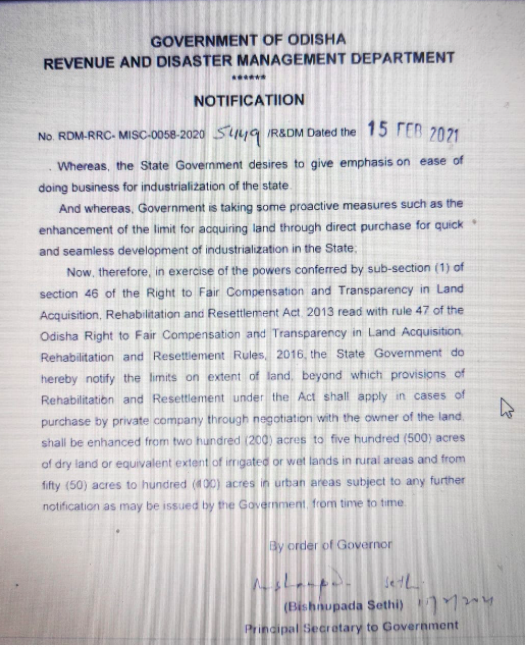Odisha: ‘Ease of Doing Business’ at Cost of Tribal Land and Livelihood
File Photo.
New Delhi: As the movement against the three farm laws intensifies across India, tribal farmers in Odisha are facing new threats amid the government's latest move to allow corporates to purchase land. As per a notification released by the state government on February 15, the rural land cap for purchase by a private company has been increased from 200 acre to 500 acre.
“...the State government do hereby notify that limits of extent of land beyond which provisions of Rehabilitation and Resettlement Rules under the Act shall apply in cases of purchase by private company through negotiation with the owner of the land shall be enhanced from two hundred (200) to five hundred (500) acres of dry land or equivalent extent of irrigated or wet lands in rural areas and from fifty (50) acres to hundred (100) acres in urban areas subject to any further notification as may be issued by the Government from time to time,” says the notification.
Activists and farmers in the state fear that the move is targeted to please businesses and is an attack on land rights of tribal farmers, further diminishing their bargaining power.

After a long-standing movement, the 2013 Land Acquisition and Rehabilitation Act was enacted, but to further industrialise the state, the Odisha government now wants to convert common land into private holdings, say activists.
While the government claims that the idea of the notification is to ‘ease doing business’, but with land acquisition being termed as the “biggest hurdle”, the move is being seen as an attempt to trample land rights.
“The whole idea of the notification is to override the rehabilitation and resettlement policy of 2003 and 2006,” said Advocate Sankar Pani, who deals with cases pertaining to land movements.
Speaking with NewsClick, Sandeep Patnaik, a researcher on land rights based in Odisha, said: “The first problem is that the government is brushing its hands off of any rehabilitation, since now the land will be privately owned and the spirit of rehabilitation and resettlement Act is being trampled upon. Moreover, when different companies try to exert pressure on tribals to give away their land, those with limited bargaining power will not stand a chance. The move will affect the ongoing movement in the state against privatisation and taking away of tribal lands.”
The notification, issued by the Revenue and Disaster Management (R&DM) Department, puts the onus of negotiation on land owners, many in this case being tribal farmers with limited or no bargaining power, he added.
Moreover, private companies can now buy 100 acres in urban areas which was earlier limited to 50 acres. "This is being done as a proactive measure for quick and seamless development of industrialisation in the state," R&DM secretary B P Sethi said.
In Odisha, protests have also been going on in the tribal hinterland against the Centre’s three farm laws, and activists in the state see this notification as an extension of those very farm laws for which there is a countrywide farmers’ protest to demand repeal.
Speaking with NewsClick, activist Prafulla Samanta said: “The 2013, Land Acquisition and Rehabilitation Act clearly stipulated the minimal use of agricultural land for industrial development, but now, the area limit has been extended from 200 acres to 500 acres. This is sheer manipulation of the law to benefit the corporates, since they will no longer need to conduct public hearings or even compensate those who lose agricultural or even common land.”
He said: “In Odisha, we have been opposing contract farming, which will lead to excessive privatisation of land, completely erasing out tribal farmers. Maximum amount of land, therefore, will be transferred, which is also a threat to food security.”
Get the latest reports & analysis with people's perspective on Protests, movements & deep analytical videos, discussions of the current affairs in your Telegram app. Subscribe to NewsClick's Telegram channel & get Real-Time updates on stories, as they get published on our website.























